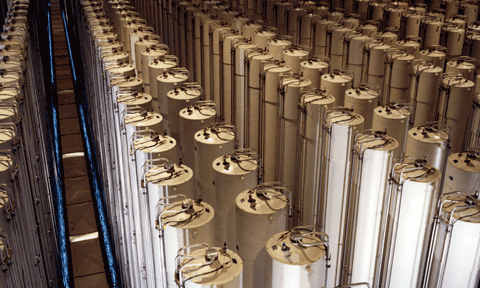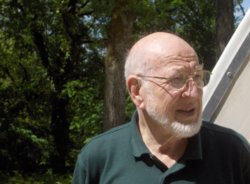The Birth of an International Nuclear Fuel Bank?
26 May, 2009 08:26 am
In a speech on 5 April 2009 in Prague, Czech Republic, US President Barack Obama said that his Administration will: negotiate a new strategic arms reduction treaty with Russia this year; immediately and aggressively pursue U.S. ratification of the Comprehensive Test Ban Treaty; seek a new treaty that verifiably ends the production of fissile materials intended for use in nuclear weapons; and seek to build ?a new framework for civil nuclear cooperation, including an international fuel bank, so that countries can access peaceful power without increasing the risks of proliferation? (1).
 |
The IAEA has been recommending for some time that a nuclear fuel bank should be set up in a way that would not disrupt the existing commercial market in nuclear fuels (3). IAEA Director General Mohamed El Baradei explains, "I want to make sure that every country that is a bona fide user of nuclear energy, and that is fulfilling its non-proliferation obligations, is getting fuel. It is not asking any State to give up its rights under the NPT (Non-Proliferation Treaty). The importance of this step is that, by providing reliable access to fuel at competitive market prices, we remove the need for countries to develop indigenous fuel cycle capabilities. In so doing, we could go a long way towards addressing current concerns about the dissemination of sensitive fuel cycle technologies” (4). The two most sensitive technologies, insofar as nuclear-weapon proliferation is concerned, are uranium-enrichment and plutonium-reprocessing.
Both
Any proposal to reduce the threats associated with the increase in the use of nuclear power is inevitably likely to have serious drawbacks. It is likely to be regarded by many non-nuclear-weapon countries to be discriminatory and, therefore, unacceptable. Some countries, such as
The support of Barack Obama for a nuclear fuel bank closely follows the announcement that his Administration will cancel the
But the issue of GNEP is not yet over because the Obama Administration has cancelled the
The advocates of reprocessing argue that it makes considerably easier the management of radioactive waste produced by nuclear-power reactors. But other experts argue that this is not true. For example, Steve Fetter, Dean of the School of Public Policy of the University of Maryland, and Frank von Hippel, Professor of Public and International Affairs at Princeton University, point out that reprocessing would not remove the need for a permanent repository for the disposal of high-level radioactive waste (an argument often used in favour of reprocessing) and would, in fact, be very much more expensive (7).
There is no doubt that the debate about plutonium reprocessing is important for global security. The on-going increase in the use of nuclear power reactors for electricity generation, the nuclear renaissance, will lead to the spread of plutonium to many countries. This will happen as mixed-oxide (MOX) fuel, a mixture of uranium and plutonium dioxides, is increasingly used to fuel nuclear-power reactors (instead of uranium dioxide, the current nuclear fuel) and as plutonium is used to fuel future reactor types, particularly fast breeder reactors (FBRs).
The plutonium can be separated from uranium in MOX fuel using standard chemistry and then used by countries to fabricate nuclear weapons and by terrorists to make nuclear explosives. This is an obvious threat to global security. In the words of President Obama: “we must ensure that terrorists never acquire a nuclear weapon. This is the most immediate and extreme threat to global security. One terrorist with one nuclear weapon could unleash massive destruction” (1).
The proposal for an international nuclear fuel bank has the same aim as GNEP had - to encourage the global expansion of nuclear energy while limiting the spread of technologies for the enrichment of uranium and for the reprocessing of spent nuclear-power reactor fuel to remove the plutonium from it. Some suppliers of uranium, not very surprisingly, opposed the GNEP. For example, South African Minerals and Energy Minister Buyelwa Sonjica stated that "Exporting uranium only to get it back refined, instead of enriching it in
On 16 February 2006, the
The reprocessing of spent reactor fuel elements in the
These concerns have since intensified. Dr. Mohamed El Baradei estimates that there will “pretty soon” be nine nuclear-weapon states and “probably another 10 or 20 virtual weapon states”, which could acquire nuclear weapons very quickly if they took the political decision to do so (8).
Matthew Bunn of
In a March 2006 report by the Natural Resources Defense Council, Peddling Plutonium, Thomas Cochran and Christopher Paine, two experts on civil nuclear power, point out that spent-fuel reprocessing and plutonium-fuelled fast reactors are “well-proven commercial disasters” and that “fast reactors proved to be uneconomical, highly unreliable, and prone to fires due to leaking liquid sodium coolant, which burns spontaneously when it comes in contact with air or water”. Moreover, they say: “Current international safeguards cannot monitor and measure the flow of nuclear material in reprocessing and enrichment plants with the continuity and accuracy required to promptly detect diversion from peaceful uses” to military ones (10).
The demise of the GNEP will not be mourned by those concerned about n0uclear-weapon proliferation and/or nuclear terrorism. But the proposal for an international nuclear fuel bank by no means fully addresses their concerns.
Bibliography
1. The White House Press Office,
Speech by President Barack Obama in Prague , Czeck Republic
2. International Atomic Energy Agency, International Fuel Bank, www.iaea.org/NewsCenter/PressReleases/2006/prn200615.html 3. Nuclear Engineering International, IAEA nuclear fuel bank moves step closer, says ElBaradei, Tuesday, 3 March 2009.
www.neimagazine.com/story.asp?storyCode=2052295
4. Mohamed ElBaradei, Multilateral Approaches to the Nuclear Fuel Cycle, International Nuclear Fuel Cycle Conference, 17 March 2009.
www.ukinaustria.fco.gov.uk/resources/en/pdf/elbaradei-speech-march-09
5. International Atomic Energy Agency (IAEA), IAEA Seeks Guarantees of Nuclear Fuel, Global "(Nuclear) Fuel Bank" Could Reduce Proliferation Dangers, Help Energy-Poor, IAEA Press Release 2006/15, 2006. www.iaea.org/NewsCenter/PressReleases/2006/prn200615.html
6. Global Nuclear Energy Partnership,www.world-nuclear.org/info/inf117_gnep.html
7. Steve Fetter and Frank N. von Hippel, Is U.S. Reprocessing Worth the Risk?, Arms Control Today, September 2005, pp. 6-12.
www.legacy.armscontrol.org/act/2005_09/Fetter-VonHippel.asp
8. Julian Borger, Mohamed ElBaradei warns of new nuclear age, The Guardian, 14 May 2009. www.guardian.co.uk/profile/julianborger
9. Matthew Bunn, Risks of GNEP’s Focus on Near-Term Reprocessing, Testimony for the Committee on Energy and Natural Resources, US Senate, 14 November 2007.www.energy.senate.gov/public/_files/BunnTestimony111407.doc
10.Thomas Cochran and Christopher Paine, Peddling Plutonium; Nuclear Energy Plan would make the World More Dangerous, Report by the Natural Resources Defense Council, Washington, D.C., March 2006.
www.nrdc.org
-
12/12/12
“Peak Oil” is Nonsense… Because There’s Enough Gas to Last 250 Years.
-
05/09/12
Threat of Population Surge to "10 Billion" Espoused in London Theatre.
-
05/09/12
Current Commentary: Energy from Nuclear Fusion – Realities, Prospects and Fantasies?
-
04/05/12
The Oil Industry's Deceitful Promise of American Energy Independence
-
10:00
Shaky Foundations for Offshore Wind Farms







 Read more
Read more
Some have suggested that we haul it all to Nevada and store it permanently at Yucca Mtn, which is part of the Nevada Test Site, located about 65 miles northwest of Las Vegas. The NTS occupies approx 1300 square miles (about the size of Rhode Island). The NTS is where we tested (detonated) about 900 "nuclear devices", all but 30 underground.
For more than 10 years Bechtel Corp has been expending many billions of taxpayer dollars on the Nevada version of the "Big Dig", i.e., drilling tunnels and "spent fuel" storage alcoves in Yucca Mtn.
However, the current plan for long-term, permanent burial of spent nuclear fuel at Yucca Mtn is almost dead for sound technical reasons. Also, the people of Nevada and their elected representatives do not want this material brought into their state for burial. By the way, there are no nuclear power reactors anywhere in the state of Nevada.
Then what shall we do with the 70+ thousand tons of spent nuclear fuel currently being stored at our nuclear power plants?? Regardless of your philosophy about nucear power (for or against), the storage problem is very real and it must be dealt with. Maintaining this huge volume of highly radioactive material in so many areas throughout the Country represents a clear and present danger. We don't have to worry about terrorists importing nuclear materials into the US to make a "dirty bomb". All they have to do is tap into the nuclear material inventory already here in storage. A well trained and well armed group of terrorists (foreign or domestic) might very well be able to overpower the security force at many of our commercial nuclear facilities, especially if they were not concerned about their own well being, i.e., suicidal. And they would not have to steal the spent nuclear fuel stored primarily in pools. All they would have to do is bring enough explosives with them and the resulting detonation could spew radioactivity over a very wide geographic area. Note that the containment building housing the nuclear reactor itself would not even have to come into play.
My proposal is to set up reprocessing facilities at our existing government sites, such as the Savannah River Site, Nevada Test Site, Hanford Washington Site, Idaho National Laboratory, and some of our relatively large, under-utilized military bases. Clusters of reactors could be built at these reprocessing facilities which would produce huge amounts of electricity to feed into the national grid. By using our existing government owned facilities, we take advantage of their existing infrastructure, including well trained and experienced security forces. And these sites occupy large geographic areas which for the most part are not within or near high density population areas. This proposal would also expand upon the existing technological base of nuclear reprocessing. Technical universities and the technical community near these facilties would see substantial growth and advancement. Furthermore, we would be spreading the solution to an existing serious problem throughout the country rather than dumping the entire problem in a single area for someone else to deal with years later.
Perhaps the people of Nevada would be willing to participate in such a multi-state recycling program at the NTS where the re-processed nuclear material would be used to fuel clusters of next-generation power reactors that would go a long way towards weening us off fossil fuel plants with their resulting carbon dioxide emissions. Note that my proposal includes "clusters" of reactors. Such an arrangement allows for permanent staffing of operations, maintenance, refueling and testing personnel which could eliminate the need for temps, travellers and contractors.
This nationwide situation we are in, calls for a national solution. And the solution I propose calls for a rather straight forward, yet intense engineering and scientic effort. Some of the positive attributes of the Nevada Test Site, Hanford Washington, Savannah River and the INL being involved in this solution is that they encompass large geographic areas, they have already been involved in "nuclear matters", they have some of the technical and scientic resources already in place, they have Department of Energy and State oversight, and they have large, well-trained security forces in place.